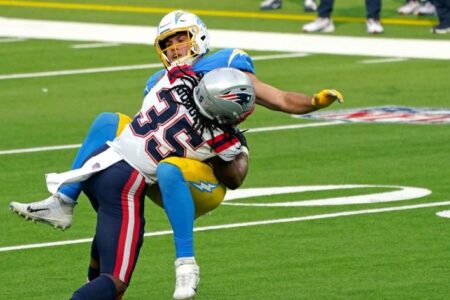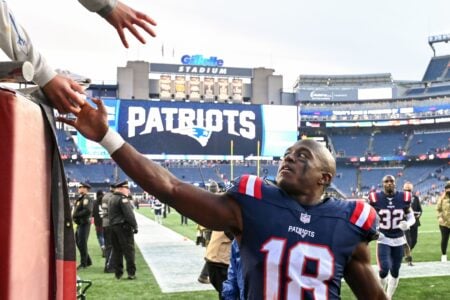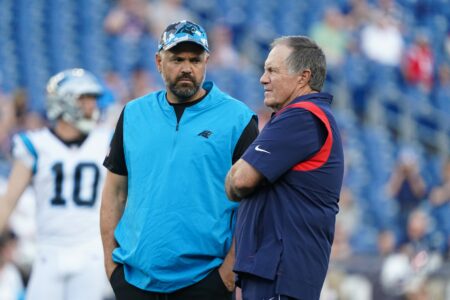On D&C this morning, Kerry Byrne of CHFF argued that it's always been a passing league, and as evidence, he cited the fact that the last guy to win the league in rushing and also an NFL championship was some unknown dude back in like 1951. And they went through the great running backs and asked what have these guys won: Eric ****erson, Adrian Peterson, MJD, Chris Johnson, etc.
But my goodness. As much as Byrne is solid on the numbers, he's very short on logic, at least in this case. The question isn't whether you need a rushing champ to win the title. The question is whether the league has always been a passing league. And that's pretty easy to figure out.
Let's just look at the Super Bowl era - 46 seasons. Has the NFL in that time always been a passing league? No, no, no, no, no.
Year - Champion - Passing Stats - Rushing Stats
1966 - Packers - 318 att, 2257 yds - 475 att, 1673 yds
1967 - Packers - 331 att, 2758 yds - 474 att, 1915 yds
1968 - Jets - 436 att, 3574 yds - 467 att, 1608 yds
1969 - Chiefs - 351 att, 2638 yds - 522 att, 2220 yds
1970 - Colts - 416 att, 3087 yds - 411 att, 1336 yds
1971 - Cowboys - 361 att, 3037 yds - 512 att, 2249 yds
1972 - Dolphins - 259 att, 2235 yds - 613 att, 2960 yds
1973 - Dolphins - 256 att, 1675 yds - 507 att, 2521 yds
1974 - Steelers - 386 att, 2154 yds - 546 att, 2417 yds
1975 - Steelers - 337 att, 2544 yds - 581 att, 2633 yds
1976 - Raiders - 361 att, 3195 yds - 557 att, 2285 yds
1977 - Cowboys - 372 att, 2689 yds - 564 att, 2369 yds
1978 - Steelers - 380 att, 2961 yds - 641 att, 2297 yds
1979 - Steelers - 492 att, 3724 yds - 561 att, 2603 yds
1980 - Raiders - 456 att, 3294 yds - 541 att, 2146 yds
1981 - 49ers - 517 att, 3766 yds - 560 att, 1941 yds
1982 - Redskins - 253 att, 2068 yds - 315 att, 1140 yds (strike - 9 g)
1983 - Raiders - 504 att, 3910 yds - 542 att, 2240 yds
1984 - 49ers - 496 att, 4079 yds - 534 att, 2465 yds
1985 - Bears - 432 att, 3303 yds - 610 att, 2761 yds
1986 - Giants - 472 att, 3500 yds - 558 att, 2245 yds
1987 - Redskins - 478 att, 3718 yds - 500 att, 2102 yds (strike - 15 g)
1988 - 49ers - 502 att, 3675 yds - 527 att, 2523 yds
1989 - 49ers - 483 att, 4584 yds - 493 att, 1966 yds
1990 - Giants - 398 att, 2898 yds - 541 att, 2049 yds
1991 - Redskins - 447 att, 3771 yds - 540 att, 2049 yds
1992 - Cowboys - 491 att, 3597 yds - 500 att, 2121 yds
1993 - Cowboys - 475 att, 3617 yds - 490 att, 2161 yds
1994 - 49ers - 511 att, 4362 yds - 491 att, 1897 yds
1995 - Cowboys - 494 att, 3741 yds - 495 att, 2201 yds
1996 - Packers - 548 att, 3938 yds - 465 att, 1838 yds
1997 - Broncos - 513 att, 3704 yds - 520 att, 2378 yds
1998 - Broncos - 491 att, 3808 yds - 525 att, 2468 yds
1999 - Rams - 530 att, 4580 yds - 431 att, 2059 yds
2000 - Ravens - 504 att, 3102 yds - 511 att, 2199 yds
2001 - Patriots - 482 att, 3326 yds - 473 att, 1793 yds
2002 - Buccaneers - 567 att, 3665 yds - 414 att, 1557 yds
2003 - Patriots - 537 att, 3651 yds - 473 att, 1607 yds
2004 - Patriots - 485 att, 3750 yds - 524 att, 2134 yds
2005 - Steelers - 379 att, 3104 yds - 549 att, 2223 yds
2006 - Colts - 558 att, 4397 yds - 439 att, 1762 yds
2007 - Giants - 544 att, 3376 yds - 469 att, 2148 yds
2008 - Steelers - 506 att, 3607 yds - 460 att, 1690 yds
2009 - Saints - 544 att, 4490 yds - 468 att, 2106 yds
2010 - Packers - 541 att, 4355 yds - 421 att, 1606 yds
2011 - Giants - 589 att, 4933 yds - 411 att, 1427 yds
Let's use the major 2004 rule changes as a point of demarcation.
Prior to 2004:
- 38 champions
- only 6 had more passing attempts than rushing attempts (15.8%)
- pass att/G: 28.9 pass yds/G: 219.1
- rush att/G: 34.0 rush yds/G: 140.6
- run/pass att ratio: 1.18 run/pass yds ratio: 0.642
2004-present:
- 8 champions
- 6 had more passing attempts than rushing attempts (75.0%) - including the last six in a row
- pass att/G: 32.4 pass yds/G: 250.1
- rush att/G: 29.2 rush yds/G: 117.9
- run/pass att ratio: 0.90 run/pass yds ratio: 0.472
The bottom line is this: teams are passing far more than they used to, and to a much higher degree of effectiveness. Teams used to rely on the run to a far greater degree than they do now. Heck, for some really good teams, the run is almost an afterthought now. It's pass, pass, pass. Look at those teams in the 70's. Man, they ran a LOT. Even the great 49er, Cowboy, and Bronco teams with hall-of-fame quarterbacks like Montana, Aikman, and Elway ran more than they threw. There have always been outliers, but the trend is unmistakeable. Winning teams always seemed to have better passing QBs than the other guys, but that doesn't mean that they relied on the pass more than the run. It's just not true.
Kerry Byrne, I love your stuff on CHFF, but my friend, you are D.E.A.D. wrong that this has always been a passing league.
But my goodness. As much as Byrne is solid on the numbers, he's very short on logic, at least in this case. The question isn't whether you need a rushing champ to win the title. The question is whether the league has always been a passing league. And that's pretty easy to figure out.
Let's just look at the Super Bowl era - 46 seasons. Has the NFL in that time always been a passing league? No, no, no, no, no.
Year - Champion - Passing Stats - Rushing Stats
1966 - Packers - 318 att, 2257 yds - 475 att, 1673 yds
1967 - Packers - 331 att, 2758 yds - 474 att, 1915 yds
1968 - Jets - 436 att, 3574 yds - 467 att, 1608 yds
1969 - Chiefs - 351 att, 2638 yds - 522 att, 2220 yds
1970 - Colts - 416 att, 3087 yds - 411 att, 1336 yds
1971 - Cowboys - 361 att, 3037 yds - 512 att, 2249 yds
1972 - Dolphins - 259 att, 2235 yds - 613 att, 2960 yds
1973 - Dolphins - 256 att, 1675 yds - 507 att, 2521 yds
1974 - Steelers - 386 att, 2154 yds - 546 att, 2417 yds
1975 - Steelers - 337 att, 2544 yds - 581 att, 2633 yds
1976 - Raiders - 361 att, 3195 yds - 557 att, 2285 yds
1977 - Cowboys - 372 att, 2689 yds - 564 att, 2369 yds
1978 - Steelers - 380 att, 2961 yds - 641 att, 2297 yds
1979 - Steelers - 492 att, 3724 yds - 561 att, 2603 yds
1980 - Raiders - 456 att, 3294 yds - 541 att, 2146 yds
1981 - 49ers - 517 att, 3766 yds - 560 att, 1941 yds
1982 - Redskins - 253 att, 2068 yds - 315 att, 1140 yds (strike - 9 g)
1983 - Raiders - 504 att, 3910 yds - 542 att, 2240 yds
1984 - 49ers - 496 att, 4079 yds - 534 att, 2465 yds
1985 - Bears - 432 att, 3303 yds - 610 att, 2761 yds
1986 - Giants - 472 att, 3500 yds - 558 att, 2245 yds
1987 - Redskins - 478 att, 3718 yds - 500 att, 2102 yds (strike - 15 g)
1988 - 49ers - 502 att, 3675 yds - 527 att, 2523 yds
1989 - 49ers - 483 att, 4584 yds - 493 att, 1966 yds
1990 - Giants - 398 att, 2898 yds - 541 att, 2049 yds
1991 - Redskins - 447 att, 3771 yds - 540 att, 2049 yds
1992 - Cowboys - 491 att, 3597 yds - 500 att, 2121 yds
1993 - Cowboys - 475 att, 3617 yds - 490 att, 2161 yds
1994 - 49ers - 511 att, 4362 yds - 491 att, 1897 yds
1995 - Cowboys - 494 att, 3741 yds - 495 att, 2201 yds
1996 - Packers - 548 att, 3938 yds - 465 att, 1838 yds
1997 - Broncos - 513 att, 3704 yds - 520 att, 2378 yds
1998 - Broncos - 491 att, 3808 yds - 525 att, 2468 yds
1999 - Rams - 530 att, 4580 yds - 431 att, 2059 yds
2000 - Ravens - 504 att, 3102 yds - 511 att, 2199 yds
2001 - Patriots - 482 att, 3326 yds - 473 att, 1793 yds
2002 - Buccaneers - 567 att, 3665 yds - 414 att, 1557 yds
2003 - Patriots - 537 att, 3651 yds - 473 att, 1607 yds
2004 - Patriots - 485 att, 3750 yds - 524 att, 2134 yds
2005 - Steelers - 379 att, 3104 yds - 549 att, 2223 yds
2006 - Colts - 558 att, 4397 yds - 439 att, 1762 yds
2007 - Giants - 544 att, 3376 yds - 469 att, 2148 yds
2008 - Steelers - 506 att, 3607 yds - 460 att, 1690 yds
2009 - Saints - 544 att, 4490 yds - 468 att, 2106 yds
2010 - Packers - 541 att, 4355 yds - 421 att, 1606 yds
2011 - Giants - 589 att, 4933 yds - 411 att, 1427 yds
Let's use the major 2004 rule changes as a point of demarcation.
Prior to 2004:
- 38 champions
- only 6 had more passing attempts than rushing attempts (15.8%)
- pass att/G: 28.9 pass yds/G: 219.1
- rush att/G: 34.0 rush yds/G: 140.6
- run/pass att ratio: 1.18 run/pass yds ratio: 0.642
2004-present:
- 8 champions
- 6 had more passing attempts than rushing attempts (75.0%) - including the last six in a row
- pass att/G: 32.4 pass yds/G: 250.1
- rush att/G: 29.2 rush yds/G: 117.9
- run/pass att ratio: 0.90 run/pass yds ratio: 0.472
The bottom line is this: teams are passing far more than they used to, and to a much higher degree of effectiveness. Teams used to rely on the run to a far greater degree than they do now. Heck, for some really good teams, the run is almost an afterthought now. It's pass, pass, pass. Look at those teams in the 70's. Man, they ran a LOT. Even the great 49er, Cowboy, and Bronco teams with hall-of-fame quarterbacks like Montana, Aikman, and Elway ran more than they threw. There have always been outliers, but the trend is unmistakeable. Winning teams always seemed to have better passing QBs than the other guys, but that doesn't mean that they relied on the pass more than the run. It's just not true.
Kerry Byrne, I love your stuff on CHFF, but my friend, you are D.E.A.D. wrong that this has always been a passing league.
Last edited:


















